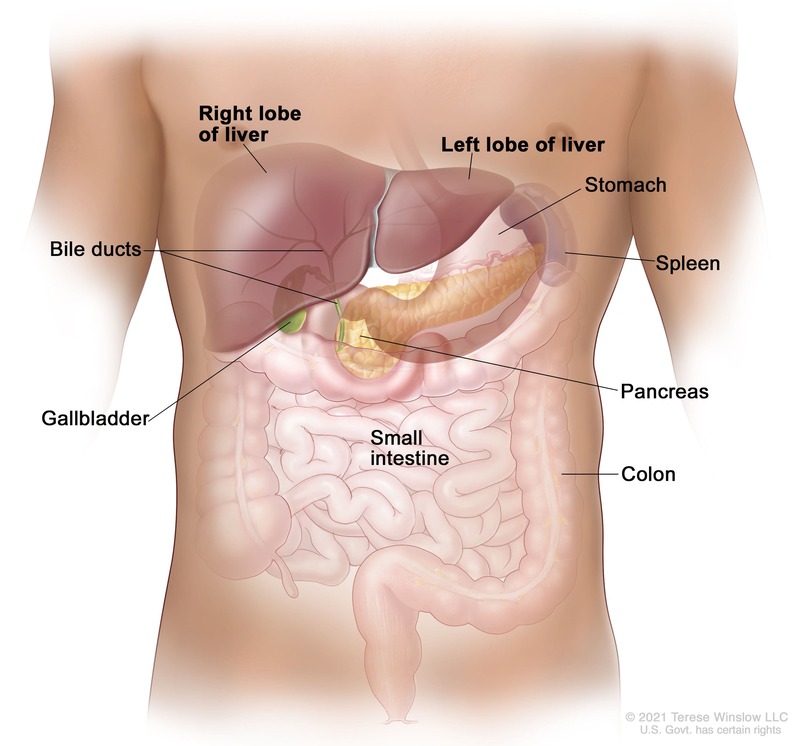Bile Duct Cancer is when cancer cells form in your bile ducts, the network of tubes that connect your liver, gallbladder, and small intestine. Bile Duct Cancer can present as Cholangiocarcinoma or Gallbladder Cancer. Resectable Bile Duct Cancer is the earliest stage of the disease.
Tap “Watch Now” for an easy-to-understand overview of Billiary Tract Resectable Liver Cancer.
- Billiary Tract Resectable Liver Cancer
Overview
Resectable Bile Duct Cancer is when the cancer is found only in the gallbladder or bile ducts, making it accessible and removable through surgery.
It also means that the tumor has not affected any nearby structures or other organs.
What Tests Will I Need and Why?
Blood and Imaging tests are done to understand your general health, confirm your diagnosis and determine your cancer stage.
Tissue analysis is also typically done to identify the cancer cell type, which is critical to finding the best treatment option for you.
If your treatment team has not already performed tests to determine your cancer’s features, please ask your doctor when these tests will be performed.
Re-read this summary as needed and then tap, “Compare My Treatment Options Now“. Our unique Comparison Page will help you understand your FDA-approved treatment options including, who can help you pay for your treatment, where and how each is given and what side-effects you may experience.

Cancer Research U.K. CC BY-SA 4
Recommended Liver Cancer Videos

Liver Cancer In 4 Minutes
Hear from Doctor Sachin MODI

How Cancer Spreads
Metastatic = Advanced

Diagnosing Your Cancer
How Does a CT Scan Work?

Diagnosing Your Cancer
How Does a PET Scan Work?

Exercise! You Can Do It
Reducing Side Effects & More
Commonly Searched Questions
Resectable Bile Duct Cancer Symptoms
Resectable bile duct cancer does not normally present with symptoms. However, these are some symptoms that may occur;
- Yellowing of the eyes and skin (jaundice) and pale stool
- Feeling weak constantly
- An abnormal swollen abdomen
- Nausea and vomiting
- Unintentional weight loss
- A lump on the right side below the rib cage
Source: Cancer.gov
Resectable Bile Duct Cancer Treatment
These are some common treatment options that are available for your intrahepatic bile duct cancer:
- Surgery to remove your cancer which may include a partial hepatectomy that means part of your liver is removed.
These are some common treatment options that are available for your perihilar bile duct cancer:
- Surgery to remove your cancer which may include a partial hepatectomy that means part of your liver is removed
- A stent is placed to direct bile out of the body.
These are some common treatment options that are available for your distal bile duct cancer:
- Surgery to remove your cancer which may include a partial hepatectomy that means part of your liver is removed or the whipple procedure may be done.
- A stent is placed to direct bile out of the body.
Now Click Here To Compare Your Latest Treatment Options.
Source: Cancer.gov
Resectable Bile Duct Cancer Survival Rate
According to SEER data, resectable bile duct cancer has a survival rate of 36.1%. This generally means that people with resectable bile duct cancer are 36.1% as likely as people without cancer to live for 5 years after the diagnosis.
Source: Cancer.gov
Resectable Bile Duct Cancer Recurrence Rate
Specific recurrence rates for resectable bile duct cancer are not always detailed, as these can vary based on several factors, including the tumor’s location, size, and the success of the surgery. Generally, the recurrence rate for resectable bile duct cancer can be influenced by how completely the cancer was removed during surgery and the effectiveness of any additional treatments.
For a more precise and personalized estimate of recurrence risk, it is best to consult with a healthcare provider who can consider individual circumstances and provide tailored information based on the most recent data and research.
Source: Cancer.gov
Resectable Bile Duct Cancer Definition
Resectable bile duct cancer is defined as bile duct cancer that can be surgically removed. This typically means that the cancer is localized to the bile ducts and has not spread to distant parts of the body or to nearby structures in a way that makes surgery impossible. In this stage, the tumor is considered operable, and the goal of treatment is to remove the cancerous tissue, which may involve surgery to remove part or all of the bile duct, the surrounding tissues, and possibly nearby lymph nodes. The potential for successful resection depends on the tumor’s size, location, and whether it has invaded nearby tissues or organs.
Source: Cancer.gov
Resectable Bile Duct Cancer Prevention
While specific strategies for preventing metastatic or locally advanced bile duct liver cancer are not explicitly defined, general approaches to reduce the risk of developing bile duct cancer include:
- Manage Chronic Conditions: Properly manage chronic liver diseases and infections, such as hepatitis B and C, which increase the risk of bile duct cancer.
- Avoid Alcohol: Limit or avoid alcohol consumption to prevent liver damage and lower cancer risk.
- Healthy Diet and Weight Management: Eat a balanced diet rich in fruits, vegetables, and whole grains, and maintain a healthy weight. Limit consumption of red and processed meats.
- Quit Smoking: Avoid tobacco use, as smoking is a risk factor for various cancers, including bile duct cancer.
- Protect Against Hepatitis Infections: Get vaccinated against hepatitis B and take precautions to avoid hepatitis C infection.
- Limit Exposure to Carcinogens: Reduce exposure to harmful chemicals and substances that could increase cancer risk.
- Regular Medical Check-ups: Regular check-ups and screenings are important for individuals with liver disease or other risk factors to monitor liver health and detect any potential issues early.
Source: Cancer.gov






